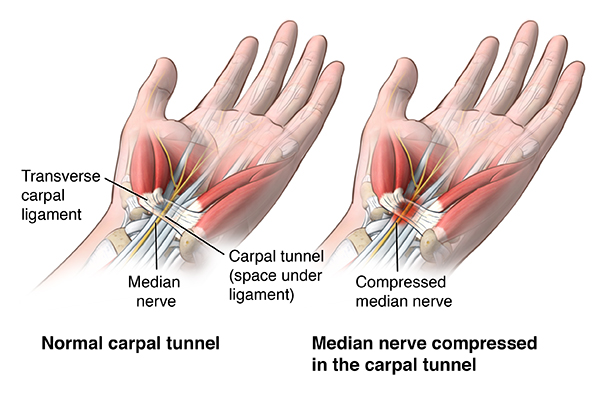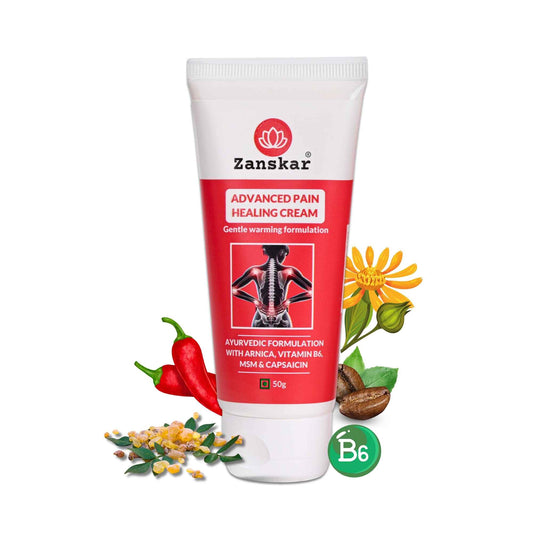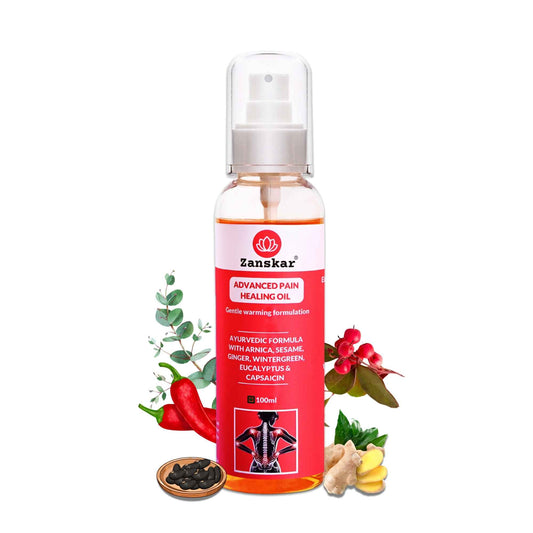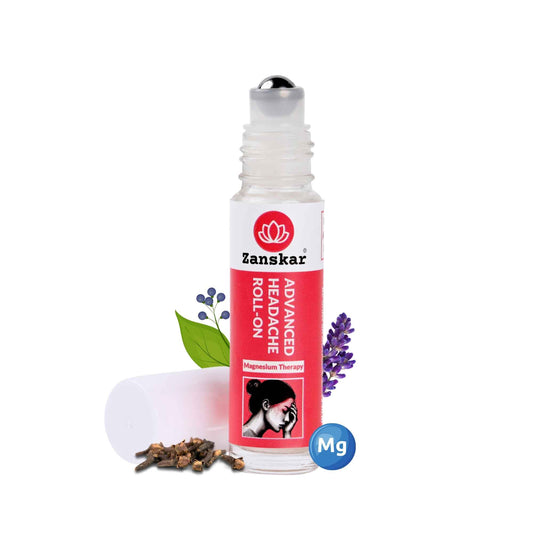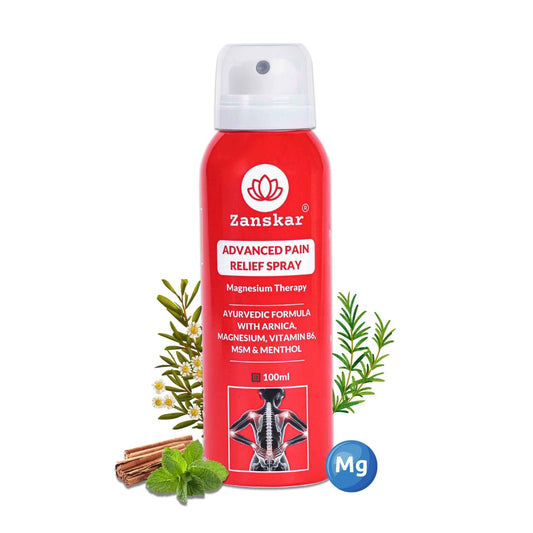
Tingling, Aching Hands in Pregnancy? It could be Carpal Tunnel Syndrome
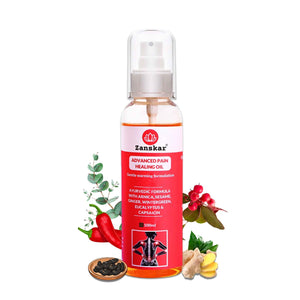
Swelling – everywhere – is one of the most common symptoms of pregnancy. Patients often notice extra puffiness in their face, legs, and feet. But for some women, swelling manifests inside the wrist, resulting in carpal tunnel syndrome (CTS), most noticeable in 2nd and 3rd trimester. Though it is usually temporary, carpal tunnel syndrome in pregnancy can cause a lot of discomfort while symptoms persist.
What is Carpal Tunnel Syndrome?
The bones of the forearm have the median and ulnar nerve along with the muscle tendons in them. In fact, the median nerve of the hand supplies sensory information to the lateral half of your palm (flexor aspect). Fluid retention and inflammation of the arm compress the nerve during pregnancy, resulting in tingling, numbness, and pain in the hands. A group of such symptoms is also known as carpal tunnel syndrome during pregnancy.
What Causes Carpal Tunnel Syndrome in Pregnancy?
A 2015 study claims that Carpal tunnel syndrome (CTS) is commonly found in 31 to 62% of pregnancies. Although researchers are not quite sure why pregnancy carpal tunnel takes place, they have speculated that pregnancy hormones that are responsible for pregnancy swelling – (swollen feet, hands, and other parts of the body) give rise to carpal tunnel syndrome at this time.
During pregnancy, your blood volume doubles. That extra fluid increases pressure and swelling in the blood vessels throughout your body. In tight spaces such as the carpal tunnel area of the wrist – through which nine tendons and one nerve pass – the swelling can compress the median nerve, which runs to the hand.
The median nerve gives sensation to the palm-side surface of thumb, index, and middle fingers, and half the ring finger. It's also responsible for helping to move the muscles in the hand that bend your fingers.
Nerve compression can cause pain, tingling, and numbness in the wrist and hand, which may increase when you're trying to sleep. Pregnancy may be the first time CTS symptoms arise since incidence rates are only ~4% not counting for pregnancy cases.
Who is at High Risk Of Pregnancy-induced Carpal Tunnel Syndrome?
Those of you who are at high risk are:
- If You’re Overweight: It’s still not entirely clear, whether your being plus-size during your pregnancy might give rise to this problem. However, some studies have indicated that your being overweight is one of the reasons for this syndrome.
- If You’ve Pregnancy-induced Diabetes or Hypertension: Due to gestational diabetes and hypertension during your pregnancy, there might be fluid retention, swelling, and inflammation. This might further increase the risk of this problem.
- If You’ve Been Pregnant Earlier: Although the soaring relaxin hormone level is responsible for expanding your pelvis and preparing your cervix for childbirth this hormone during pregnancy plays its role in causing carpal tunnel syndrome especially if you had been pregnant earlier.
- If You’re More Than 30 Years Old: As per a 2017 study, if you’re pregnant and 35 years old with a body mass index (BMI, kg/m2) of 33.14, you might undergo this problem. If you’re 40 years, and pregnant with health conditions like diabetes mellitus, hypertension, depression, and overweight, you might have a chance of developing such a problem.
Symptoms and Treatment
Symptoms of carpal tunnel syndrome usually show up in the later part of second and third trimester. The symptoms are typically more pronounced at night due to fluid redistribution, as well as wrist positioning while sleeping. The pressure in the carpal tunnel can increase two to three times when the wrist is in full flexion or extension, explains a Zanskar expert.
Common symptoms include:
- Pain in the wrist, hands or fingers
- Burning sensation
- Tingling
- Numbness
- Weakness
- Decreased dexterity
The good news is that the symptoms of pregnancy-related carpal tunnel syndrome typically go away after delivery, though it can take up to six weeks postpartum before they improve, says our expert. It is important to carefully monitor symptoms as they can persist and lead to permanent nerve damage.
When it comes to treating the symptoms of carpal tunnel syndrome in pregnancy, orthopedic experts recommend conservative methods as a first line of treatment. These include:
- Wearing a splint or wrist brace with the wrist in a neutral position while sleeping
- Hand therapy for exercises to help control swelling
- Medications – ask your doctor if medications such as nonsteroidal anti-inflammatory topical ointments are safe to take during pregnancy.
Additional things you can do at home to help relieve carpal tunnel symptoms include:
- Stretch and gently shake your wrists and hands frequently to relieve pain and improve circulation
- Make sure to properly position your hands and wrists when doing repetitive motions such as typing, focusing on keeping your wrists straight
- Reducing salt intake to decrease swelling
A 2012 study shows that almost 50% percent of pregnant women experience the symptoms in both hands. With the progression of the pregnancy, the symptoms might worsen. In this case, treatment is the best way out.
When will symptoms improve?
After delivery, your fluid levels and the extra pressure in your blood vessels will decrease. As such, your symptoms will likely improve or resolve.
That being said, new mothers use their hands and wrists nearly constantly. Lifting, changing, and feeding the new baby may lead to worsened or new hand and wrist symptoms.
Let your Ob/Gyn know as soon as symptoms begin. If we catch carpal tunnel early enough, we can start conservative treatments to reduce the risk of nerve damage or lingering symptoms.
After pregnancy, keep an eye on your wrist health. You'll be lifting your baby a lot and making repetitive motions, which can lead to tendinopathies related to overuse.
Even if your new aches and pains don't seem overtly pregnancy-related, let your Ob/Gyn know. Pregnancy does strange things to the body, and your doctor can help you find relief from painful or annoying symptoms. Do not hesitate to reach out to your doctor.
Learn More About Zanskar Health
If you have joint or muscle pain that makes it hard to move, Zanskar offers the most advanced full stack pain relief solutions for you.
Now available to purchase, Zanskar® Advanced Pain Care Products have a unique formulation of natural bioactive ingredients and provide lasting relief from muscle and joint discomfort that you can feel good about. Get your fix before stocks run out - buy now.
You can also gain access to therapeutic exercises and stretches for your condition by downloading the Zanskar Health physiotherapy mobile app. Additionally, you’ll have a personal care team to guide, support, and tailor our program to you, including behavioral and nutritional coaching.
Download our mobile app here 👉 download and track your exercise streak.
Medical Review: This article is written by Dr Nishtha Mittal (Senior Health Content Editor at Zanskar Health) and has been medically reviewed by the medical team at Zanskar Health. This article and its contents are provided for educational and informational purposes only and do not constitute medical advice or professional services specific to you or your medical condition.

